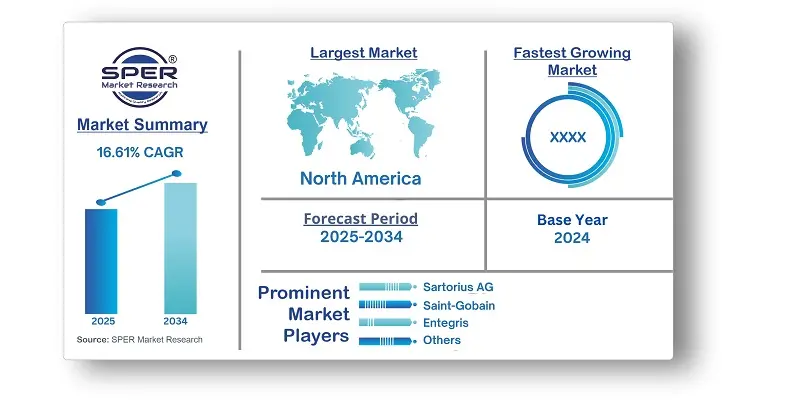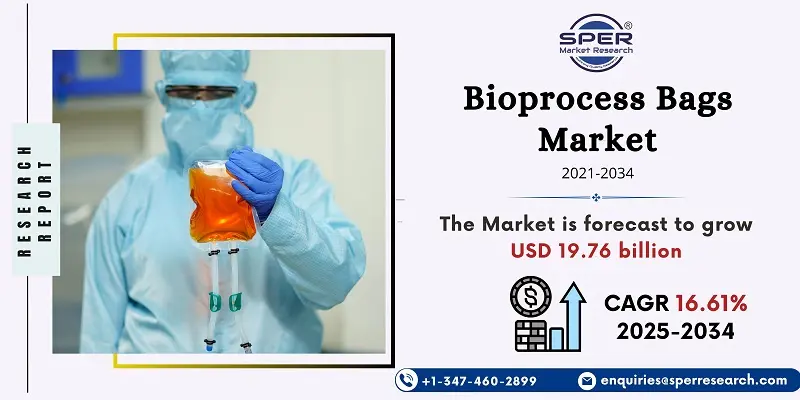
Bioprocess Bags Market Growth, Trends, Size, Revenue, Demand and Future Outlook
Bioprocess Bags Market Growth, Size, Trends Analysis - By Type, By Workflow, By End User - Regional Outlook, Competitive Strategies and Segment Forecast to 2034
| Published: Jan-2025 | Report ID: HLCA2524 | Pages: 1 - 245 | Formats*: |
| Category : Healthcare | |||


- March 5, 2024: The Sartorius Group, a worldwide supplier of pharmaceutical and laboratory equipment, focused on bioprocess solutions, created the Sartorius Flexboy single-use bag, a 2D bag option, available in chamber volumes from 5 ml to 50 L. This flexible series of Flexboy Pre-Designed Solutions (PDS) enables the handling of all biopharmaceutical fluids, such as sterile filtration, transfer, and storage. The various configurations are made for easy integration into different process steps.
- In April 2022, Thermo Fisher Scientific, Inc. announced a new manufacturing facility in Ogden, Utah, to produce materials and technology for new vaccines and therapies. The USD 44 million facility will help meet the rising demand for single-use technology.
- Thermo Fisher Scientific Inc will open its largest single-use technology production facility in Greater Nashville in August 2022, with a USD 150 million investment. The Lebanon, Tennessee factory is the largest manufacturing facility in the company's biologics production network.
| Report Metric | Details |
| Market size available for years | 2021-2034 |
| Base year considered | 2024 |
| Forecast period | 2025-2034 |
| Segments covered | By Type, By Workflow, By End User. |
| Regions covere | North America, Latin America, Asia-Pacific, Europe, and Middle East & Africa. |
| Companies Covered | Thermo Fisher Scientific Inc, Sartorius AG, Danaher Corporation, Merck KGaA, Saint-Gobain, Corning Incorporated, Entegris, Meissner Filtration Products, Inc, PROAnalytics, LLC, CellBios Healthcare & Lifesciences Pvt Ltd. |
- Global Bioprocess Bags Market Size (FY’2021-FY’2034)
- Overview of Global Bioprocess Bags Market
- Segmentation of Global Bioprocess Bags Market By Type (2D Bioprocess Bags, 3D Bioprocess Bags, Other Bags & Accessories)
- Segmentation of Global Bioprocess Bags Market By Workflow (Upstream Process, Downstream Process, Process Development)
- Segmentation of Global Bioprocess Bags Market By End User (Pharmaceutical & Biopharmaceutical Companies, CMOs & CROs, Academic & Research Institutes)
- Statistical Snap of Global Bioprocess Bags Market
- Expansion Analysis of Global Bioprocess Bags Market
- Problems and Obstacles in Global Bioprocess Bags Market
- Competitive Landscape in the Global Bioprocess Bags Market
- Details on Current Investment in Global Bioprocess Bags Market
- Competitive Analysis of Global Bioprocess Bags Market
- Prominent Players in the Global Bioprocess Bags Market
- SWOT Analysis of Global Bioprocess Bags Market
- Globa Bioprocess Bags Market Future Outlook and Projections (FY’2025-FY’2034)
- Recommendations from Analyst
1.1. Scope of the report1.2. Market segment analysis
2.1. Research data source
2.1.1. Secondary Data2.1.2. Primary Data2.1.3. SPERs internal database2.1.4. Premium insight from KOLs
2.2. Market size estimation
2.2.1. Top-down and Bottom-up approach
2.3. Data triangulation
4.1. Driver, Restraint, Opportunity and Challenges analysis
4.1.1. Drivers4.1.2. Restraints4.1.3. Opportunities4.1.4. Challenges
5.1. SWOT Analysis
5.1.1. Strengths5.1.2. Weaknesses5.1.3. Opportunities5.1.4. Threats
5.2. PESTEL Analysis
5.2.1. Political Landscape5.2.2. Economic Landscape5.2.3. Social Landscape5.2.4. Technological Landscape5.2.5. Environmental Landscape5.2.6. Legal Landscape
5.3. PORTERs Five Forces
5.3.1. Bargaining power of suppliers5.3.2. Bargaining power of buyers5.3.3. Threat of Substitute5.3.4. Threat of new entrant5.3.5. Competitive rivalry
5.4. Heat Map Analysis
6.1. Global Bioprocess Bags Market Manufacturing Base Distribution, Sales Area, Product Type6.2. Mergers & Acquisitions, Partnerships, Product Launch, and Collaboration in Global Bioprocess Bags Market
7.1. 2D Bioprocess Bags7.2. 3D Bioprocess Bags7.3. Other Bags & Accessories
8.1. Upstream Process8.2. Downstream Process8.3. Process Development
9.1. Pharmaceutical & Biopharmaceutical Companies9.2. CMOs & CROs9.3. Academic & Research Institutes
10.1. Global Bioprocess Bags Market Size and Market Share
11.1. Asia-Pacific
11.1.1. Australia11.1.2. China11.1.3. India11.1.4. Japan11.1.5. South Korea11.1.6. Rest of Asia-Pacific
11.2. Europe
11.2.1. France11.2.2. Germany11.2.3. Italy11.2.4. Spain11.2.5. United Kingdom11.2.6. Rest of Europe
11.3. Middle East and Africa
11.3.1. Kingdom of Saudi Arabia11.3.2. United Arab Emirates11.3.3. Qatar11.3.4. South Africa11.3.5. Egypt11.3.6. Morocco11.3.7. Nigeria11.3.8. Rest of Middle-East and Africa
11.4. North America
11.4.1. Canada11.4.2. Mexico11.4.3. United States
11.5. Latin America
11.5.1. Argentina11.5.2. Brazil11.5.3. Rest of Latin America
12.1. Thermo Fisher Scientific Inc
12.1.1. Company details12.1.2. Financial outlook12.1.3. Product summary12.1.4. Recent developments
12.2. Sartorius AG
12.2.1. Company details12.2.2. Financial outlook12.2.3. Product summary12.2.4. Recent developments
12.3. Danaher Corporation
12.3.1. Company details12.3.2. Financial outlook12.3.3. Product summary12.3.4. Recent developments
12.4. Merck KGaA
12.4.1. Company details12.4.2. Financial outlook12.4.3. Product summary12.4.4. Recent developments
12.5. Saint-Gobain
12.5.1. Company details12.5.2. Financial outlook12.5.3. Product summary12.5.4. Recent developments
12.6. Corning Incorporated
12.6.1. Company details12.6.2. Financial outlook12.6.3. Product summary12.6.4. Recent developments
12.7. Entegris
12.7.1. Company details12.7.2. Financial outlook12.7.3. Product summary12.7.4. Recent developments
12.8. Meissner Filtration Products, Inc
12.8.1. Company details12.8.2. Financial outlook12.8.3. Product summary12.8.4. Recent developments
12.9. PROAnalytics, LLC
12.9.1. Company details12.9.2. Financial outlook12.9.3. Product summary12.9.4. Recent developments
12.10. CellBios Healthcare and Lifesciences Pvt Ltd
12.10.1. Company details12.10.2. Financial outlook12.10.3. Product summary12.10.4. Recent developments
12.11. Others
SPER Market Research’s methodology uses great emphasis on primary research to ensure that the market intelligence insights are up to date, reliable and accurate. Primary interviews are done with players involved in each phase of a supply chain to analyze the market forecasting. The secondary research method is used to help you fully understand how the future markets and the spending patterns look likes.
The report is based on in-depth qualitative and quantitative analysis of the Product Market. The quantitative analysis involves the application of various projection and sampling techniques. The qualitative analysis involves primary interviews, surveys, and vendor briefings. The data gathered as a result of these processes are validated through experts opinion. Our research methodology entails an ideal mixture of primary and secondary initiatives.



Frequently Asked Questions About This Report
PLACE AN ORDER
Year End Discount
Sample Report
Pre-Purchase Inquiry
NEED CUSTOMIZATION?
Request CustomizationCALL OR EMAIL US
100% Secure Payment






Related Reports
Our Global Clients
Our data-driven insights have influenced the strategy of 200+ reputed companies across the globe.






















